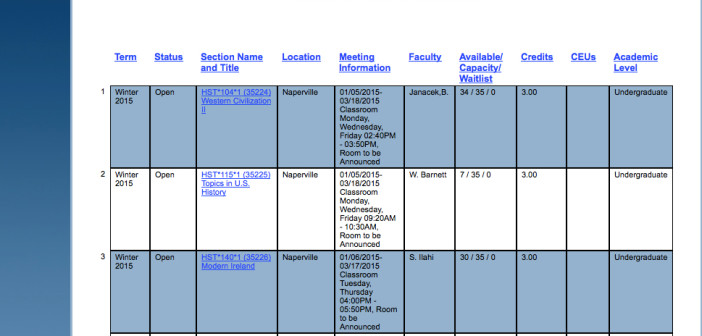Megann Horstead
Social Media Editor
Today’s colleges must continuously re-evaluate its programs to ensure they are relevant and in sync with contemporary needs.
Overseeing departmental progress requires attention to forces that play a role in bringing about curricular change. Associate Academic Dean Francine Navakas said sticking to the College’s roots to interdisciplinary study works to bring change.
“It’s a matter of recognizing the role of interdisciplinary teaching and program leadership in many settings–in curricular planning and scheduling, in shaping cultural events, in general education–bringing these opportunities to every student.”
New ideas can come from a number of directions. In turn, the College has a system in place to help maintain order.
Peter Barger, Director of Institutional Effectiveness, said when it is due, curricular change comes from the faculty department, Office of Academic Affairs, outside forces such as the state of Illinois, Academic Programs and Policies Committee (also known as APPC), or a combination of these groups.
Each department designs its curriculum while the Office of Academic Affairs oversees progress through programs reviews.
But when gray areas rest between one or more curriculums, a faculty governance system (consisting of APPC, faculty professional development committee, and faculty welfare committee) is in place, Barger said.
At the departmental level, a program and its offerings are tested for effectiveness every seven years.
Because introducing new measures can take time, curricular change can take place anytime shortly after a program review, according to Barger who emphasized a need for flexible deadlines.
Program reviews have been around since the ‘90s. Because outside forces are judging program offerings, these evaluations will continue, Barger said.
The education department was one area calling for change recently.
Changing state of Illinois requirements over the last 1.5 years have ushered in curricular changes to NCC’s education department, Barger said.
Another example of departmental change can been seen in English.
“English is one major that has changed the approach to doing their tracks to streamline it a little bit,” Barger said. “Every once in a while, a discipline will either modernize or we need to change our curriculum so that it’s comparable to different colleges.”
Computer Science offers another look at curricular change.
Computer science, like some other programs, changes relatively slowly over time allowing changes to be applied within the boundaries of the original courses, Barger said.
Although, it is known that with change generally comes pressure, Navakas refuted that NCC is concerned about needing to expand its offerings.
“The collaboration between the departments is central to solving complex problems and adapting to the rapidity of change,” Navakas said. “On a campus of our size connected learning is relatively easy to accomplish because there aren’t the barriers of size or separate schools to discourage dialogue and collaborative efforts.”
“Of course, we can’t provide extensive programs in every combination,” Navakas said. “But I have great confidence that ‘in the mix’ will be a hefty contribution from interdisciplinary areas.”

